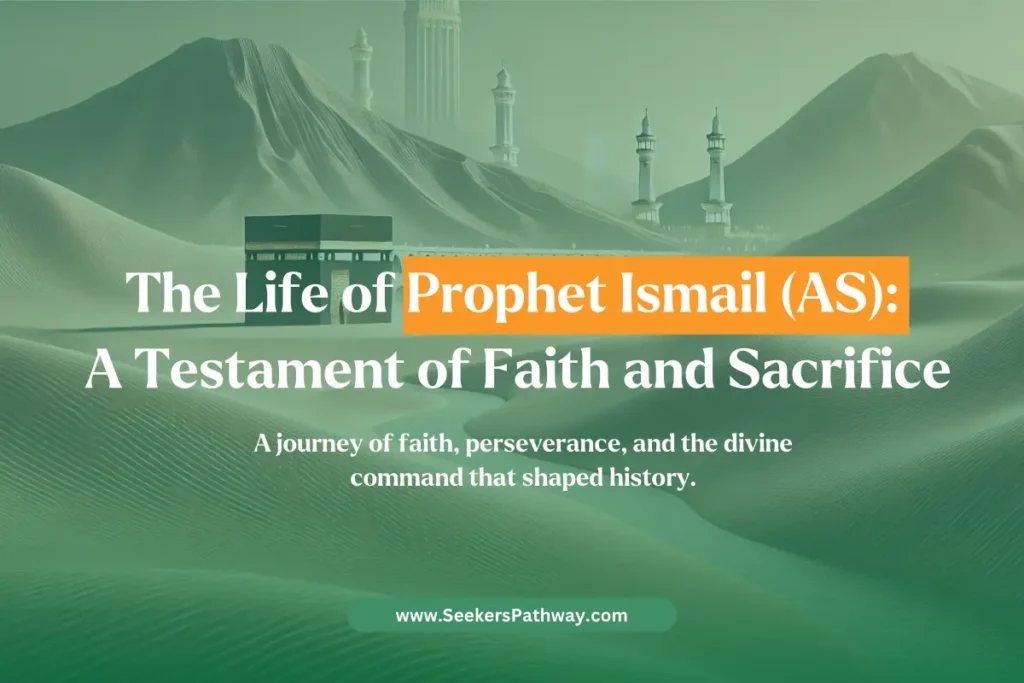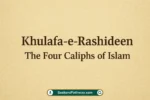Prophet Ishmael (AS) was the son of Prophet Ibrahim (AS) and Hajar (AS), and his life epitomised patience, sacrifice, and steadfastness in faith. He is associated with some of the immense tests, from being left in the barren land of Makkah as a baby to being tested in sacrifice by his father. It is stated in the Quran that Ismail (AS) was truthful to his promise, patient, devoted to prayer, and giving charity. His rebuilding of the Kaaba and his righteousness, which led to one of the most important prophets with his offspring, leading to the last messenger, Prophet Muhammad ﷺ.
Lineage and Early Life
Prophet Ishmael (AS) was a blessing given to Ibrahim (AS) by Allah in his old age. His mother, Hajar (AS), was a righteous lady and one of the important individuals in Makkah. But Allah tested Ibrahim (AS) by instructing him to leave his wife Hajar (AS) and infant child Ismail (AS) in the desolate desert of Makkah. Obeying Allah, despite the lack of resources, with little more than food to survive.
Instead, Hajar (AS), understanding that this was the will of Allah, put her trust in Him, saying:
“If Allah has commanded this, then He will not abandon us.”
(Tafsir Ibn Kathir)
As Ibrahim (AS) departed, he supplicated to Allah:
“Our Lord! I have settled some of my offspring in an uncultivated valley near Your Sacred House, our Lord, so that they may establish prayer. So make hearts among the people incline toward them and provide for them from the fruits that they might be grateful.”
(Surah Ibrahim 14:37)
The Miracle of Zamzam
As the days went by, the little food and water with Hajar (AS) finished. She began to run back and forth in search of water, between the two mountains of Safa and Marwah, seven times!
In His mercy, Allah made the well of Zamzam gush forth from underneath the feet of Ismail (AS). This blessed water, which still springs to this day, facilitated the early settlement of Makkah.
After some time, a caravan of the Jurhum tribe passed by and found the water spring, and they requested the Prophet and his son to allow them to live there in the valley. Thus, Ismail (as) grew up among them and learned Arabic, and he was a strong, noble, and righteous young man.

Marriage and the Visit of Prophet Ibrahim (AS)
When Ishmael (AS) grew up, he married a woman from the Jurhum tribe.
When Prophet Ibrahim (AS) later visited Makkah, he found Ismail (AS) was not there. When he had a conversation with his wife, he realised how ungrateful and discontent she was. He was not identifiable to Ismail (AS) so he left him a message.
“Tell your husband to change the threshold of his door.”
Ismail (AS) went back, and when he heard the message, he knew it was his father instructing him to divorce his wife because she was not a righteous woman (sister in faith).
The woman later got married to Ismail (AS) and gave birth to a son called Ibrahim, who would later visit his father and was pleased to see how much faith the woman had. This wife became his partner for life.
The Greatest Test: The Sacrifice of Ishmael (AS)
Many years passed, and Prophet Ibrahim (AS) had a dream a number of times, which Allah commanded him to slaughter his favourite son, Ismail (AS). Knowing that the dream of a prophet is a Divine command, he went to his son:
“O my son, indeed I have seen in a dream that I must sacrifice you, so see what you think.”
(Surah As-Saffat 37:102)
What came next was a real test of faith. Without delay, Ismail (AS) responded in complete submission to the will of Allah with absolute obedience:
“O my father, do as you are commanded. You will find me, if Allah wills, among the patient.”
(Surah As-Saffat 37:102)
While Ibrahim (AS) was ready to sacrifice, Allah divinely saved Ismail (AS) in His mercy.
“And We ransomed him with a great sacrifice, and We left for him [favourable mention] among later generations.”
(Surah As-Saffat 37:107-108)
This event served as a basis for Eid al-Adha, representing acts of obedience, faith, and submission to Allah.
Rebuilding the Kaaba with Prophet Ibrahim (AS)
Allah then ordered Ibrahim (AS) and Ismail (AS) to reconstruct the Kaaba, the first House of Worship. They placed together the foundation stones, supplicating:
“Our Lord, accept [this] from us. Indeed, You are the Hearing, the Knowing.”
(Surah Al-Baqarah 2:127)
They also prayed:
“Our Lord, make us both submissive to You, and [raise] from our descendants a nation submissive to You. Show us our ways of worship, and turn to us in mercy. Indeed, You are the Most Accepting of Repentance, the Most Merciful.”
(Surah Al-Baqarah 2:128)
Once the Kaaba was complete, Allah then instructed Prophet Ibrahim (AS) to call the people to Hajj, and millions responded on even day.
Prophet Ismail (AS) as a Messenger
Allah gave prophethood to Ismail (AS), and Ismail (AS) preached Tawheed (belief in one God) to the Arabs. As the Quran describes his noble character:
“And mention in the Book, Ishmael. Indeed, he was true to his promise, and he was a messenger and a prophet. And he used to enjoin on his people prayer and zakah and was pleasing to his Lord.”
(Surah Maryam 19:54-55)
He put particular emphasis on his own devotion to prayer (salah) and charity (zakah).
The Death and Legacy of Prophet Ismail (AS)
Islamic traditions maintain that Prophet Ismail (AS) lived for a very long time and earned the honour of Prophethood, although the Quran does not explore the specifics of this death.
Some reports say he was buried next to the Kaaba in the Hateem area, as others argue it was to his mother Hajar (AS).
His legacy continues on through Hajj, the well of Zamzam, and his lineage that produced the Prophet Muhammad ﷺ
Lessons from the Life of Prophet Ismail (AS)
- Complete Trust in Allah – We should have total faith in Allah’s plan, just like Hajar (AS) and Ismail (AS) had.
- Adhering to Allah’s Commands – The split between the heart and action was bridged by Ismail (AS) by showing that true submission is to obey Allah, regardless of how intense the test.
- Prayer and Charity – He commanded his people to establish salah and zakah, fundamental pillars of Islam.
- Sacrifice and Devotion – His death reminds us that true success is in seeking Allah.
Conclusion
Prophet Ismail (AS) thus has become an enduring symbol of sacrifice, faith, and obedience. And his story teaches us that faith requires action, patience, and trust in Allah’s wisdom.
May we strive to be like him instilling Tawheed, Sabr, and Ibadah. Ameen.










